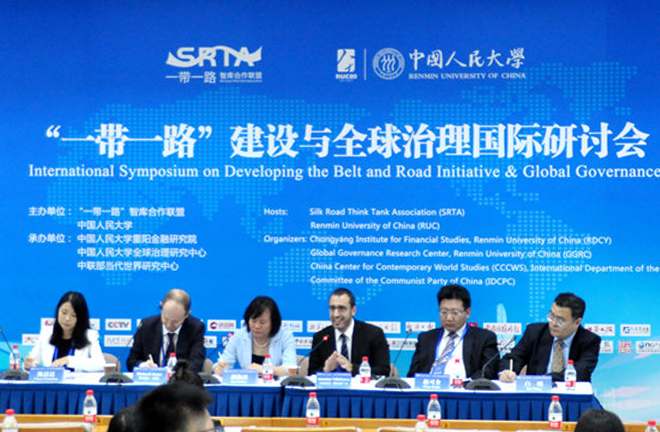Symposium stresses role of Belt and Road in global governance

The International Symposium on Developing the Belt and Road Initiative and Global Governance was held on Sept. 30 at Renmin University of China.
More than 300 experts and scholars from China and abroad recently gathered in Beijing to discuss the relationship between the “Belt and Road” initiative and the existing global governance regime, root causes for global governance deficits and how the “B&R” initiative could lead to new innovations in global governance.
The International Symposium on Developing the Belt and Road Initiative and Global Governance was held at Renmin University of China. It was co-hosted by the Silk Road Think Tank Association and Renmin University.
Zhang Yanling, former vice-president of the Bank of China, elaborated on the ways the “B&R” initiative is being implemented in Egypt.
“The Jushi Egypt project has filled the void of fiberglass manufacturing in North Africa, creating more than 2,000 jobs,” Zhang said, adding that locals accounted for 66 percent of the middle management and 99 percent of the production frontline.
The “B&R” initiative has gradually turned ideas into reality in recent years as China demonstrates farsightedness in infrastructure construction along the routes, said Slawomir Majman, president of the Polish Information and Foreign Investment Agency.
Western countries normally only plan the period before the next election, whereas China is capable of making long-term plans to ensure policy continuity and stability, Majman said, expressing faith that the “B&R” initiative will be sustainable.
In addition to cataloguing the progress and achievements of “B&R” construction, attendees shed light on how the initiative could help resolve problems of global governance.
He Weiwen, former economic and commercial counselor at the Chinese Consulate General in San Francisco and New York, said the traditional model led by the West has become obsolete. He highlighted its fragmented governance system and inability to cope with the backlash against globalization as the major defects of the current global governance mechanism.
The “B&R” initiative can effectively address the problems by updating and upgrading global governance, He said.
For one thing, the initiative is about inclusive and fair governance, He said. Furthermore, it is equipped with sound top-level design, covering extensive cooperation in fields of policy, infrastructure, trade, capital and culture, which is conducive to overcoming the compartmentalization and unilateralism of the existing governance system.
In addition, the “B&R” initiative prioritizes the maximization of social benefits rather than pursuing capital. The purpose of the initiative is to forge a community of common destiny for mankind and reverse the trends against globalization that result from uneven development, He added.
Noting profound changes in the world pattern and unsustainable unilateralism, Danilo Türk, former president of Slovenia, said that multilateralism is the right way to solve global issues and the right direction for future development.
A series of ambitious projects in the “B&R” initiative have provided opportunities to strengthen global multilateralism, Türk said.
Implementing the 2030 Agenda for Sustainable Development is a crucial task in global development governance. Alena Pachion, policy advisor of the UNDP Global Partnership Team, said that the “B&R” initiative, aiming at strengthening infrastructure connectivity and boosting regional development, will facilitate the poverty elimination and inclusive sustainable industrialization goals in the 2030 agenda.
The initiative can play a bigger role in global governance by connecting to the 2030 agenda, Pachion said.
MAO LI is a reporter at the Chinese Social Sciences Today.
